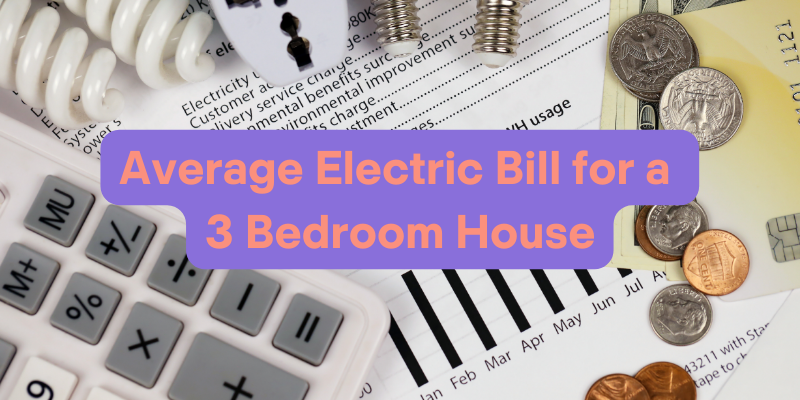What’s the Average Electric Bill for a 3 Bedroom House?
The average electric bill for a 3-bedroom house — or any house, for that matter — has increased substantially over the last few years several years due to rising utility rates and extreme weather events requiring more electricity for heating and cooling.
With this rather sudden upward shift in electricity costs, it’s only natural to wonder if your higher electricity bill is on par with your peers. So, we used the latest data from the Energy Information Administration to determine the average electricity bill for homeowners in each region of the US based on their home size and number of bedrooms.
Use the links below to jump to a section:
- What’s the average electricity bill for a 3-bedroom house?
- How much electricity does a 3-bedroom house use per day?
- Average electric bill per square footage
Before diving in, it’s important to note that every household has a unique mix of electricity consumption and utility rates. The figures below are based on state and regional data that may not reflect your unique energy situation. Connect with a solar.com Energy Advisor to analyze your specific electricity costs and explore ways to lower them.
What’s the average electricity bill for a 3-bedroom house?
Heading into 2025, the average electric bill for a 3-bedroom house is $163 per month nationwide and ranges from $99 in Utah to $303 in Hawaii. This is based on the latest utility rates and household consumption data for homes between 1,500 and 2,499 square feet from the EIA.
Click or hover on a state in the map below to see the average electricity bill for a 3-bedroom household.
With such a wide range from state to state, it’s worth exploring the mix of consumption and utility rates in a few states to get a better sense of what fuels high and low bills.
California
Thanks to its mild year-round climate, California has some of the lowest electricity consumption in the nation. However, with utility rates near 30 cents per kWh, the average electric bill for a three-bedroom house in California is around $179 per month — which is the 12th highest in the nation.
Florida
The average electric bill in Florida for a 3-bedroom house is $182 per month — the 11th highest average in the U.S. However, this is due to an entirely different set of circumstances than in California.
At 14.2 cents per kWh, utility rates in Florida are below the national average, but the year-round heat and humidity require much more air conditioning which drives up electricity usage. In fact, at 1,279 kWh per month, 3-bedroom homeowners in Florida use about twice the electricity as 3-bedroom homeowners in California.
Ohio
The average electric bill for a 3-bedroom house in Ohio is $156 per month — just below the national average. Ohio is right in the middle of the pack with an average usage of 960 kWh per month and utility rates at 16.6 cents per kWh.
New York
Three-bedroom homeowners in New York State pay around $158 per month for electricity, based on monthly consumption of 632 kWh and a utility rate of 25 cents per kWh. This ranks 27th out of the 51 states and Washington DC, thanks largely to low monthly electricity consumption.
How much electricity does a 3-bedroom house use per day?
The average US home with 3 bedrooms uses 32 kWh of electricity per day or around 966 kWh per month. However, this figure ranges from 19 kWh per day in California to 44 kWh per day in Louisiana.
As shown in the map below, electricity usage is heavily tied to climate conditions. For example, Southern states use a lot of electricity to power air conditioning during the long, hot summers. Meanwhile, coastal states in the West and Northeast with more moderate climates tend to use less electricity, especially if they use gas-powered furnaces for heat during the winter.
Using the latest household electricity consumption from the EIA, we found that 3-bedroom homes (homes with 1,500 to 2,499 square feet) use, on average, 9.7% more electricity than the average household. So, if the average household uses 29 kWh per day, then a 3-bedroom household can be expected to use 32 kWh per day.
It’s worth noting that electricity usage is not necessarily tied to home size — either square footage or the number of bedrooms. For example, a 3,000-square-foot house in California may very likely use less electricity than a 2,000-square-foot in Louisiana, simply based on climate conditions and air conditioning usage alone.
There are also wildcards like EVs and heat pumps that can cause electricity usage to skyrocket — which isn’t a bad thing if it’s used to replace less efficient fossil fuel systems.
Average electric bill per square footage
On average, heating and cooling alone make up over 30% of household electricity consumption, and more square footage means more space to heat and cool throughout the year. So, larger homes tend to have higher electricity bills than smaller homes, as shown in the chart below.

For example, the average electric bill for a 1,200-square-foot house is around $133 per month, which is $50 less than the average electric bill for a 2,500 to 2,999-square-foot house. On average, the monthly electricity bill increases by $16 per 1,000 square feet of living space — which adds up to $192 throughout the year.
It’s worth noting (again) that electricity consumption and utility rates vary from home to home, so these are not hard-and-fast rules. Just observations based on national averages!
Take control of your electricity costs
While many homeowners are under the impression that the only way to reduce their electricity costs is to reduce consumption. However, home solar allows you to control the price you pay for electricity without necessarily slashing your usage.
Connect with an Energy Advisor to see if solar makes sense for your home!








